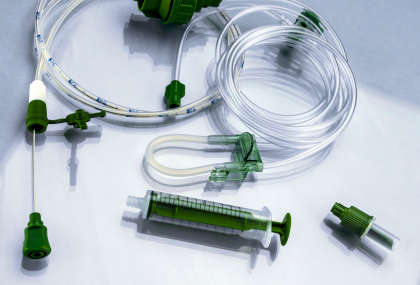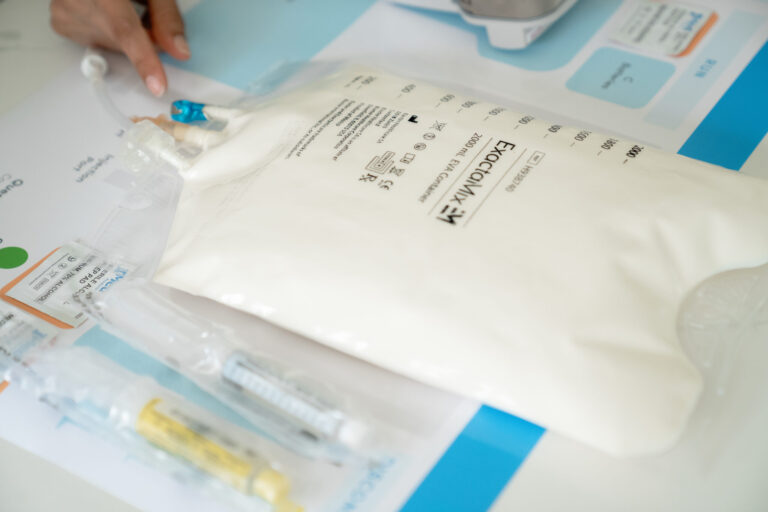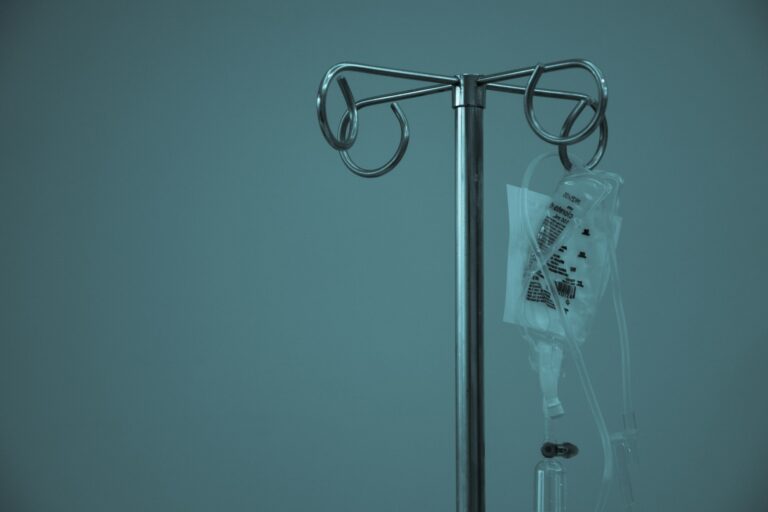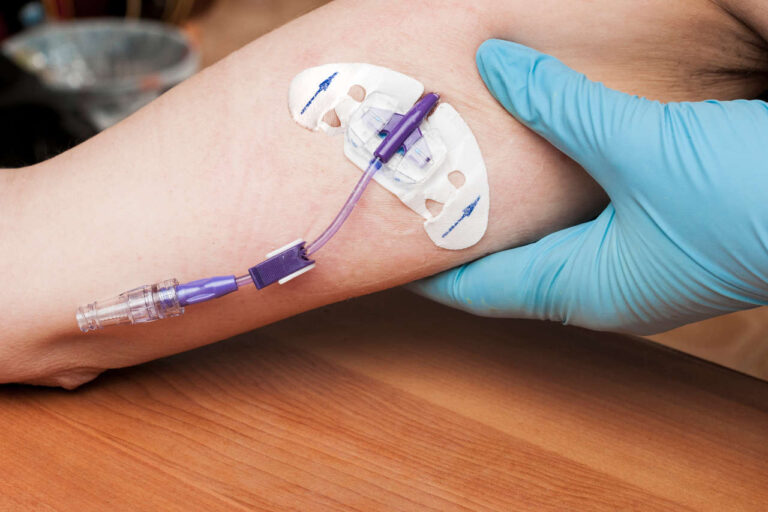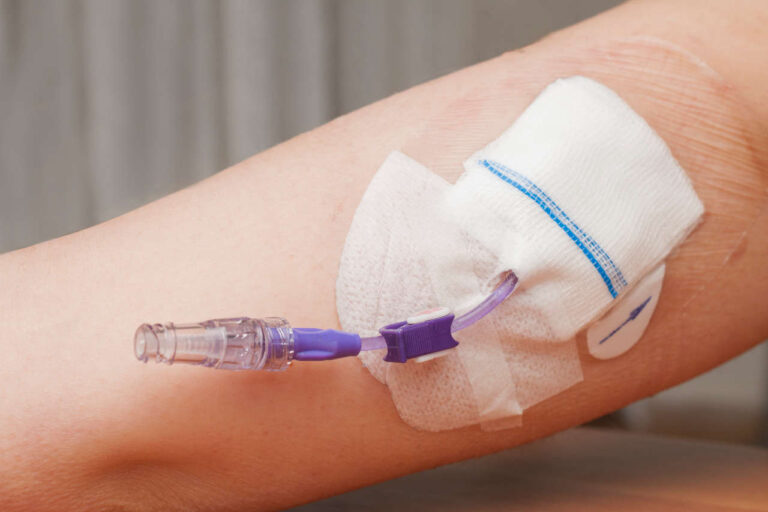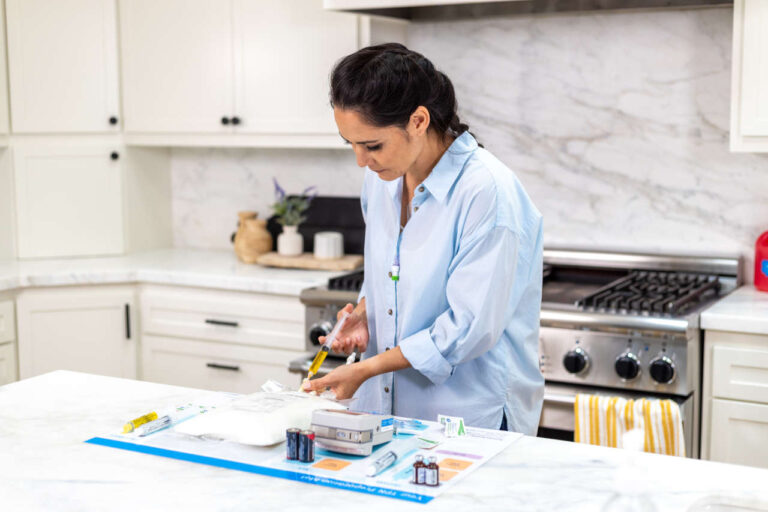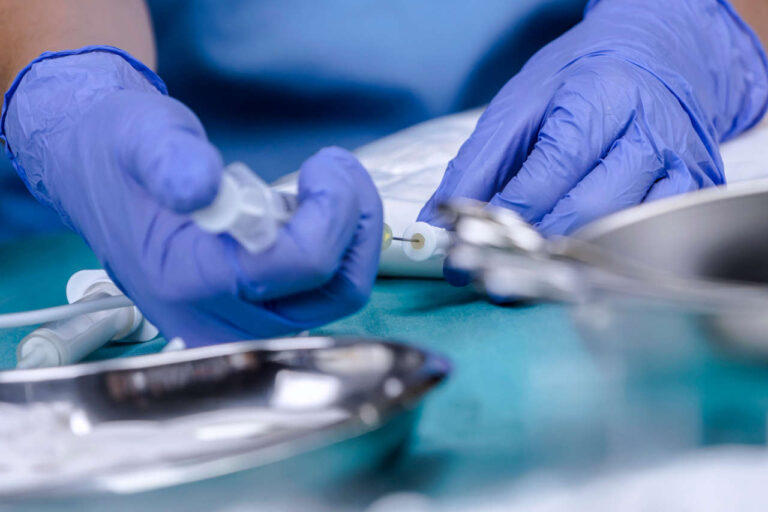
Dinh dưỡng hoàn toàn qua đường tĩnh mạch (TPN), thường được gọi là nuôi ăn tĩnh mạch, thường được bác sĩ khuyến nghị cho bệnh nhân ung thư để đáp ứng nhu cầu dinh dưỡng của họ. Dinh dưỡng này được cung cấp trong một số điều kiện nhất định, chẳng hạn như khi nuôi ăn bằng ống là không khả thi, hoặc bệnh nhân sẽ bị nhiễm độc/rối loạn chức năng đường tiêu hóa do ung thư, hạn chế khả năng hấp thụ qua đường miệng. Ung thư và các phương pháp điều trị không chỉ ảnh hưởng đến cơ thể bệnh nhân mà còn làm gián đoạn khả năng ăn uống và hấp thụ các chất dinh dưỡng thiết yếu, khiến họ có nguy cơ cao bị suy dinh dưỡng (tình trạng cơ thể không nhận được các chất dinh dưỡng thiết yếu).
Dịch truyền tĩnh mạch có sẵn đầy đủ
Sẵn sàng liên tục, chăm sóc không bị gián đoạnSuy dinh dưỡng là một trong những mối lo ngại phổ biến nhất ở bệnh nhân ung thư, ảnh hưởng xấu đến chất lượng cuộc sống và khả năng sống sót của họ. Người ta ước tính rằng có tới 20% bệnh nhân ung thư tử vong do tác động có hại của tình trạng suy dinh dưỡng chứ không phải là bản thân bệnh ác tính.
Trong bài viết này, chúng tôi sẽ thảo luận về tầm quan trọng của TPN đối với bệnh nhân ung thư, lợi ích của nó đối với những người đang chiến đấu với ung thư và tại sao nó đóng vai trò quan trọng trong quá trình điều trị và phục hồi của họ.
Trước khi đề cập đến tầm quan trọng của TPN đối với bệnh ung thư, trước tiên chúng ta hãy tìm hiểu tại sao dinh dưỡng lại quan trọng đối với bệnh nhân ung thư và ngược lại, suy dinh dưỡng ảnh hưởng đến họ như thế nào.
Dinh dưỡng và Ung thư
Giống như một người khỏe mạnh cần một chế độ ăn uống cân bằng để duy trì sức khỏe và khả năng phục hồi, bệnh nhân ung thư cũng cần dinh dưỡng hợp lý để hỗ trợ cơ thể chống lại bệnh tật. Dinh dưỡng đầy đủ rất quan trọng đối với bệnh nhân ung thư vì:
- Nó hỗ trợ hệ thống miễn dịch
- Nó cung cấp năng lượng và sức mạnh
- Nó hỗ trợ sửa chữa và chữa lành mô
- Nó tăng cường khả năng chịu đựng và hiệu quả điều trị
- Nó ngăn ngừa suy dinh dưỡng và giảm cân
- Nó cải thiện chất lượng cuộc sống và hỗ trợ sức khỏe tinh thần
Bằng cách duy trì nhu cầu dinh dưỡng, bệnh nhân ung thư có thể tối ưu hóa kết quả điều trị, duy trì chất lượng cuộc sống tốt hơn và nâng cao sức khỏe tổng thể.
Sự thiếu hụt hoặc suy dinh dưỡng xảy ra như thế nào ở bệnh nhân ung thư
Suy dinh dưỡng ở bệnh nhân ung thư có thể xuất phát từ nhiều yếu tố liên quan đến bản thân bệnh và phương pháp điều trị. Ví dụ, các phương pháp điều trị ung thư như hóa trị liều cao, xạ trị và ghép tủy xương thường gây ra các tác dụng phụ cản trở khả năng ăn uống và hấp thụ chất dinh dưỡng của bệnh nhân.
Một số tác dụng phụ thường gặp ở bệnh nhân ung thư trong giai đoạn cuối của quá trình điều trị ung thư hoặc chống ung thư là buồn nôn, nôn, loét miệng, chán ăn và khó nuốt. Những tác dụng phụ này thường dẫn đến suy dinh dưỡng và sụt cân. Tương tự, trong các trường hợp khác, một số thủ thuật phẫu thuật hoặc phương pháp điều trị nhắm vào đường tiêu hóa cũng có thể ảnh hưởng đến sự hấp thụ chất dinh dưỡng.
Khi cơ thể không nhận đủ lượng calo, protein, vitamin và khoáng chất cần thiết cho hoạt động và quá trình chữa lành tối ưu, điều này sẽ ảnh hưởng đáng kể đến khả năng chống lại bệnh tật và chữa lành của cơ thể.
Suy dinh dưỡng ảnh hưởng đến bệnh nhân ung thư như thế nào
Suy dinh dưỡng có thể gây ra những hậu quả nghiêm trọng cho bệnh nhân ung thư, ảnh hưởng đến sức khỏe tổng thể và kết quả điều trị. Một số hậu quả bao gồm:
- Hệ thống miễn dịch suy yếu:Suy dinh dưỡng làm suy yếu khả năng chống nhiễm trùng của hệ thống miễn dịch, khiến bệnh nhân ung thư dễ gặp biến chứng hơn và chậm phục hồi.
- teo cơ: Việc hấp thụ chất dinh dưỡng không đủ có thể dẫn đến teo cơ (suy nhược) ở bệnh nhân ung thư, dẫn đến suy nhược, mệt mỏi và giảm khả năng hoạt động.
- Làm chậm quá trình lành vết thương:Suy dinh dưỡng cản trở khả năng chữa lành vết thương của cơ thể, làm tăng nguy cơ nhiễm trùng và làm chậm quá trình phục hồi sau phẫu thuật hoặc các thủ thuật y tế khác.
- Độc tính điều trị: Bệnh nhân suy dinh dưỡng có thể gặp nhiều tác dụng phụ hơn từ các phương pháp điều trị ung thư do chức năng cơ quan bị suy yếu và khả năng chịu đựng liệu pháp giảm.
- Giảm chất lượng cuộc sống:Suy dinh dưỡng có thể ảnh hưởng đáng kể đến chất lượng cuộc sống của bệnh nhân, dẫn đến mệt mỏi, trầm cảm và giảm sút cảm giác khỏe mạnh.
Suy dinh dưỡng kéo dài và nghiêm trọng có thể khiến bệnh nhân ung thư có nguy cơ cao gặp các biến chứng liên quan đến điều trị ung thư. Các bác sĩ thường khuyên dùng TPN để cải thiện tình trạng dinh dưỡng của bệnh nhân ung thư và ngăn ngừa các biến chứng liên quan đến suy dinh dưỡng.
Hỏi về máy truyền dịch tại nhà TPN
Tầm quan trọng của TPN đối với bệnh nhân ung thư
TPN rất quan trọng đối với bệnh nhân ung thư vì nó làm giảm hiệu quả tác dụng phụ của các phương pháp điều trị ung thư và ngăn ngừa suy dinh dưỡng bằng cách ổn định tình trạng dinh dưỡng cho những bệnh nhân không thể đáp ứng nhu cầu dinh dưỡng thông qua đường ăn uống thường xuyên. Can thiệp dinh dưỡng này cung cấp một hệ thống hỗ trợ dinh dưỡng toàn diện và cân bằng, đảm bảo bệnh nhân ung thư nhận được các chất dinh dưỡng đa lượng và vi lượng cần thiết để hỗ trợ chức năng và quá trình phục hồi của cơ thể.
Dung dịch TPN chứa protein, carbohydrate, chất béo, vitamin, khoáng chất và các chất dinh dưỡng thiết yếu khác cần thiết cho sự phát triển của tế bào, sửa chữa mô và sức khỏe tổng thể. Dung dịch TPN được tùy chỉnh để đáp ứng nhu cầu dinh dưỡng riêng của từng bệnh nhân.
Bằng cách bổ sung các chất dinh dưỡng này qua đường tĩnh mạch, bệnh nhân ung thư có thể duy trì tình trạng dinh dưỡng và ngăn ngừa tình trạng suy giảm thêm do chế độ ăn uống không đầy đủ.
Lợi ích của TPN đối với bệnh nhân ung thư
Việc sử dụng TPN ở bệnh nhân ung thư mang lại nhiều lợi ích khác trong việc ngăn ngừa suy dinh dưỡng, chẳng hạn như:
Sửa chữa và chữa lành mô
Các phương pháp điều trị ung thư, chẳng hạn như hóa trị và xạ trị, có thể làm tổn thương cả tế bào khỏe mạnh lẫn tế bào ung thư. TPN cung cấp cho cơ thể các chất dinh dưỡng cần thiết để sửa chữa và chữa lành mô, hỗ trợ quá trình phục hồi.
Duy trì cân nặng và bảo tồn cơ bắp
Bệnh nhân ung thư có thể bị sụt cân không mong muốn và teo cơ, có thể gây ra những tác động bất lợi đến sức khỏe tổng thể và phản ứng điều trị của họ. TPN giúp duy trì lượng calo và protein cần thiết, ngăn ngừa giảm cân thêm và duy trì khối lượng cơ.
Hỗ trợ chức năng miễn dịch
Ung thư và các phương pháp điều trị ung thư làm suy yếu hệ thống miễn dịch, khiến bệnh nhân dễ bị nhiễm trùng hơn. TPN cung cấp chất dinh dưỡng tăng cường miễn dịchchẳng hạn như vitamin và khoáng chất, để hỗ trợ chức năng miễn dịch và giảm nguy cơ biến chứng.
Tăng cường khả năng dung nạp điều trị
Điều trị ung thư có thể gây ra tác dụng phụ, và suy dinh dưỡng có thể làm trầm trọng thêm các tác dụng phụ này, khiến bệnh nhân khó dung nạp liệu pháp. Bằng cách cung cấp dinh dưỡng tối ưu, TPN giúp bệnh nhân dung nạp liệu pháp tốt hơn và có khả năng cải thiện kết quả điều trị.
Hỗ trợ trước và sau phẫu thuật
Một số bệnh nhân ung thư phải phẫu thuật như một phần của kế hoạch điều trị. TPN có thể được sử dụng trước và sau phẫu thuật để đảm bảo bệnh nhân được nuôi dưỡng tốt, thúc đẩy quá trình lành vết thương và giảm nguy cơ biến chứng sau phẫu thuật.
Mặc dù TPN an toàn và dung nạp tốt cho bệnh nhân, nhưng nó cũng có thể gây ra một số rủi ro, chẳng hạn như nhiễm trùng, thừa dinh dưỡng, hạ đường huyết và mất cân bằng điện giải. Do đó, điều quan trọng là phải theo dõi cẩn thận hỗn hợp TPN và duy trì kỹ thuật vô trùng nghiêm ngặt.
Chăm sóc đặc biệt AmeriPharma®
Dinh dưỡng qua đường tĩnh mạch toàn phần | Dẫn đầu trong hỗ trợ TPNPhần kết luận
Tóm lại, TPN đóng vai trò quan trọng trong việc hỗ trợ bệnh nhân ung thư gặp khó khăn trong việc hấp thụ đầy đủ chất dinh dưỡng qua đường ăn uống. TPN giúp duy trì tình trạng dinh dưỡng, thúc đẩy quá trình lành bệnh và cải thiện sức khỏe tổng thể bằng cách trực tiếp đưa dưỡng chất thiết yếu vào máu. Mặc dù TPN cũng tiềm ẩn một số rủi ro, nhưng chúng có thể được giảm thiểu bằng cách thực hiện các biện pháp phòng ngừa phù hợp và đánh giá thường xuyên. Nhìn chung, TPN cung cấp sự hỗ trợ thiết yếu và giúp bệnh nhân ung thư tập trung vào quá trình hồi phục và hành trình hướng tới sức khỏe tốt hơn.
TÀI LIỆU THAM KHẢO:
- Yan, X., Zhang, S., Jia, J., Yang, J., Song, Y., & Duan, H. (2022). Điều trị dinh dưỡng qua đường tĩnh mạch hoàn toàn cải thiện tình trạng dinh dưỡng của bệnh nhân ung thư phụ khoa bằng cách cải thiện nồng độ Albumin huyết thanh. Biên giới trong Y học, 8, 759387. https://doi.org/10.3389/fmed.2021.759387
- Amin, SB, Livshin, S., & Maheshwari, A. (2017). Dinh dưỡng qua đường tĩnh mạch ở bệnh nhân ung thư giai đoạn cuối. Trong Chế độ ăn uống và dinh dưỡng trong chăm sóc đặc biệt (trang 1897–1912). https://doi.org/10.1007/978-1-4614-7836-2_119
- Joque, L., & Jatoi, A. (2005). Dinh dưỡng qua đường tĩnh mạch hoàn toàn ở bệnh nhân ung thư: tại sao và khi nào? PubMed, 8(2), 89–92. https://pubmed.ncbi.nlm.nih.gov/16013227
- Copeland, EM, Pimiento, JM, & Dudrick, SJ (2011). Dinh dưỡng toàn phần qua đường tĩnh mạch và ung thư: Từ khởi đầu. Phòng khám phẫu thuật Bắc Mỹ, 91(4), 727–736. https://doi.org/10.1016/j.suc.2011.04.003
- Loaiciga, F., & Dev, R. (2018). Dinh dưỡng qua đường tĩnh mạch ở bệnh nhân ung thư đang hóa trị. https://doi.org/10.1093/med/9780190658618.003.0023
- Akbulut, G. (2011). Quan điểm mới về hỗ trợ dinh dưỡng cho bệnh nhân ung thư: Dinh dưỡng qua đường tiêu hóa/ngoài đường tiêu hóa. Y học thực nghiệm và điều trị, 2(4), 675–684. https://doi.org/10.3892/etm.2011.247
- Hoda, D., Jatoi, A., Burnes, J., Loprinzi, C., & Kelly, D. (2005). Bệnh nhân ung thư giai đoạn cuối, không thể chữa khỏi có nên được cho về nhà với chế độ dinh dưỡng hoàn toàn qua đường tĩnh mạch không? Bệnh ung thư, 103(4), 863-868. https://doi.org/10.1002/cncr.20824
- Yan, X., Zhang, S., Jia, J., Yang, J., Song, Y., & Duan, H. (2021). Khám phá tình trạng suy dinh dưỡng và tác động của dinh dưỡng qua đường tĩnh mạch hoàn toàn đến kết quả điều trị của bệnh nhân ung thư buồng trứng giai đoạn tiến triển. Ung thư BMC, 21(1). https://doi.org/10.1186/s12885-021-08537-6
- Cotogni, P. (2016). Dinh dưỡng qua đường tiêu hóa so với đường tiêm ở bệnh nhân ung thư: bằng chứng và tranh cãi. PubMed, 5(1), 42–49. https://doi.org/10.3978/j.issn.2224-5820.2016.01.05
- Virizuela, JA, Camblor-Álvarez, M., Luengo-Pérez, LM, Grande, E., Álvarez-Hernández, J., Sendrós-Madroño, MJ, Capdevila, J., Cervera-Peris, M., & Ocón-Bretón, MJ (2017). Hỗ trợ dinh dưỡng và dinh dưỡng qua đường tĩnh mạch ở bệnh nhân ung thư: báo cáo đồng thuận của chuyên gia. Ung thư lâm sàng và chuyển dịch, 20(5), 619–629. https://doi.org/10.1007/s12094-017-1757-4
